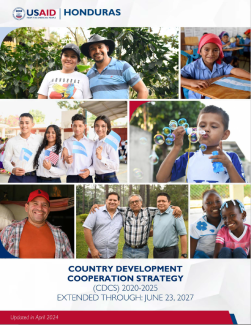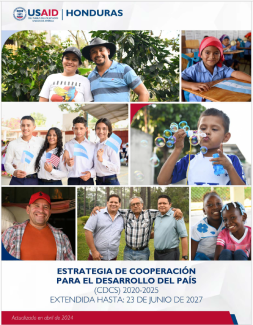USAID/Honduras’s goal for its new Country Development Cooperation Strategy is “A more prosperous, democratic, and secure Honduras where citizens, especially youth, are inspired to stay and invest in their future.” This goal is forward-looking, positive, and centers Hondurans in their own development. Under this goal, USAID/Honduras will focus on addressing the key drivers of migration through three Development Objectives (DO) that seek to improve socio-economic opportunities, enhance democratic governance to meet citizens’ needs, and improve justice and security.
DO1 (Socio-economic opportunities improved to reduce irregular migration) addresses lack of economic opportunities, a motivation for migrating cited by more than 90 percent of returned Honduran migrants. By tackling socio-economic opportunities broadly, DO1 goes beyond focusing on strictly economic outcomes to include educational opportunities, food security, youth engagement in society, and reduced vulnerability to key socio-economic shocks, including environmental shocks.
DO2 (Democratic governance to meet citizens’ needs enhanced to reduce irregular migration) explicitly addresses the challenges corruption poses to development and the future of Honduran youth, and demonstrates the centrality of democratic governance to achieving the CDCS goal. This DO is also a clear nod to USAID’s learning about the critical role of governance and service delivery in irregular migration.
DO3 (Justice and security improved to reduce irregular migration) addresses the role of violence in driving irregular migration by supporting key elements of the security and justice system to reduce impunity and ensure equitable application of the law, procedural fairness, and protection of human rights for all. Included in this DO are interventions to ensure that women, youth, and members of other marginalized populations who are survivors of violence will be empowered to demand justice and receive support services.
In addition, USAID/Honduras has identified three areas of Strategic Focus that highlight how this CDCS differs from the previous CDCS. These areas of Strategic Focus are: 1) Facilitate systems change—social, economic, justice and security, environmental, education; 2) Partner and co-create with the private sector to capitalize on shared values, foster innovation, and facilitate joint investment where interests align; and, 3) Generate opportunities for citizens—especially youth—to actively engage and invest in their future in Honduras.
For USAID/Honduras, a systems change approach means focusing on changes in the norms, behaviors, and structures which influence how the systems function and the results they produce. This strategic choice reinforces the shift to an integrated approach, which means the Mission will focus more intently on integrated programming, recognizing that the complex interdependent development challenges in Honduras require an integrated approach across the strategy.
USAID/Honduras will partner and co-create with the private sector and other stakeholders to capitalize on shared values, foster innovation, and facilitate joint investment where interests align. By meeting partners where they are instead of insisting they meet USAID where it is, the Mission can hope to achieve greater locally-led development and sustainability.
USAID’s explicit focus on youth in this strategy is a shift from the previous CDCS, and is informed by an intentional focus on migration. Research shows that being a young person is the leading predictor of migration intentions, many of whom decide to attempt to migrate irregularly. Rather than viewing Honduras’s growing youth population as problematic, this CDCS identifies the country’s youth as a demographic and democratic dividend, representing opportunities for the country's economic growth, civic engagement, and more accountable and democratic governance.
In addition to the three strategic areas of focus, USAID/Honduras is prioritizing the integration of anti-corruption throughout the CDCS. The CDCS also reflects a more deliberate focus on engaging civil society, the private sector, and the GOH on addressing corruption, which affects all areas of Honduras’s development. USAID/Honduras is also incorporating a number of cross-cutting issues into the strategy, including: Gender and Social Inclusion, Digital Technologies, Resilience, and Evidence-based Implementation.


